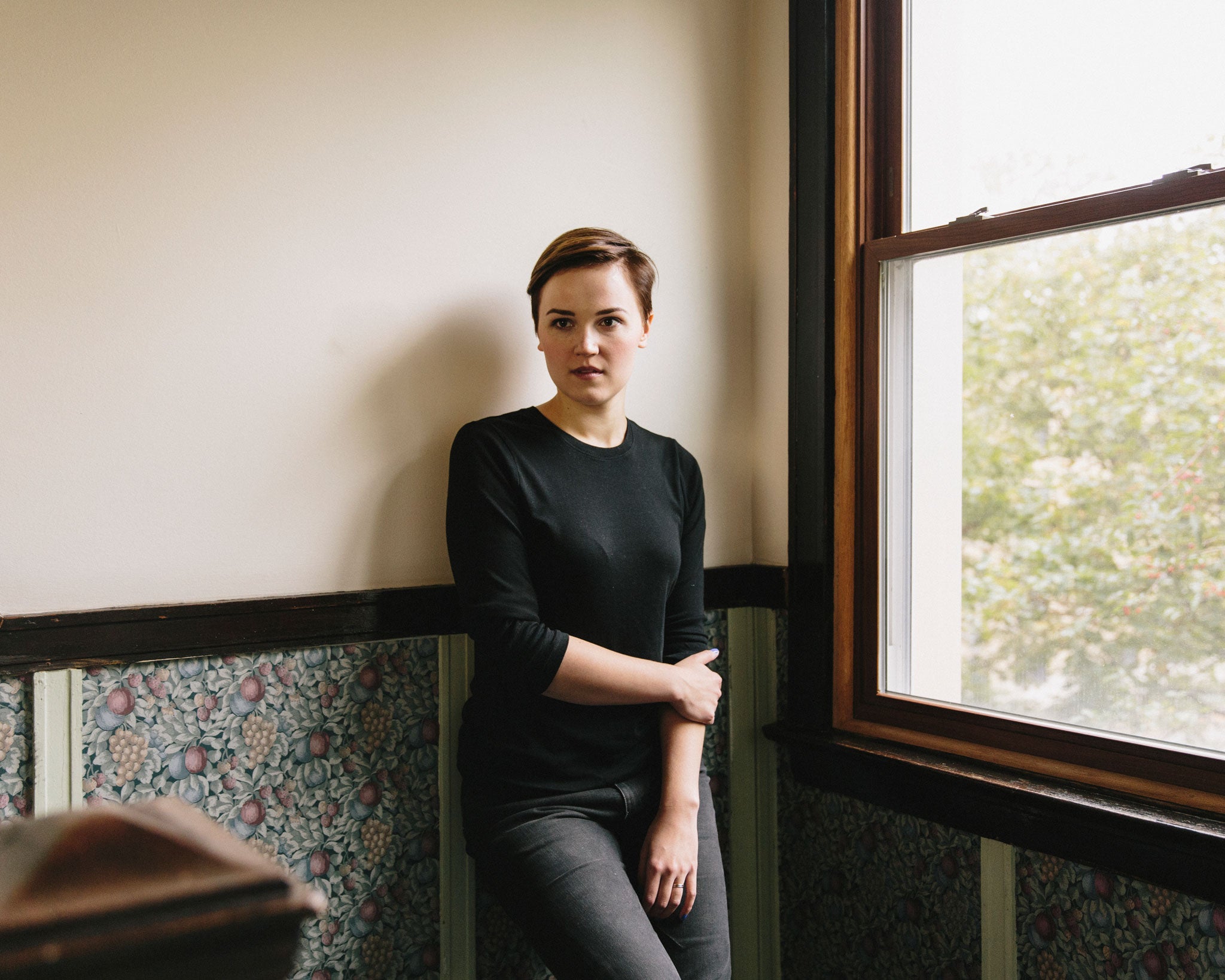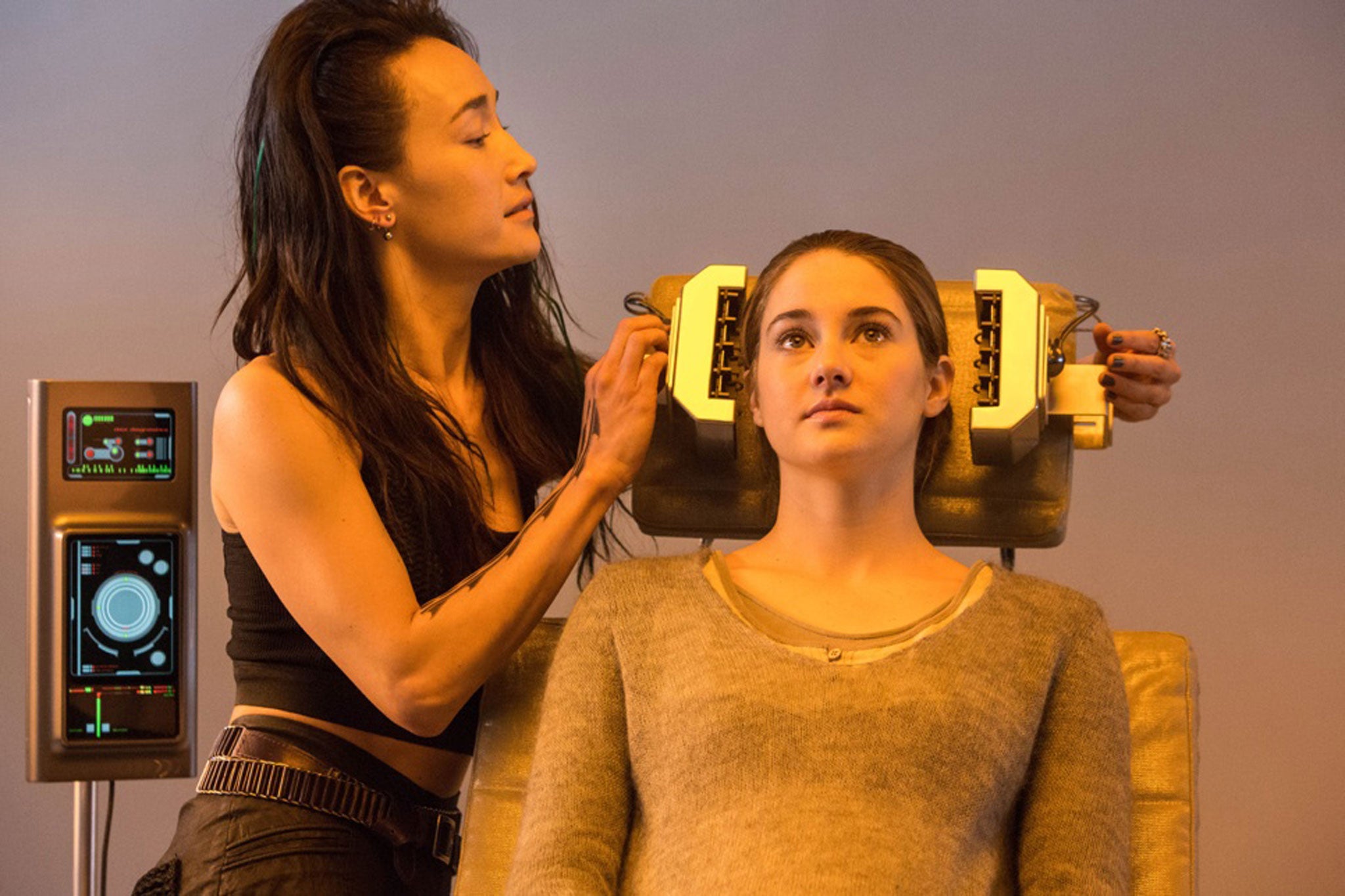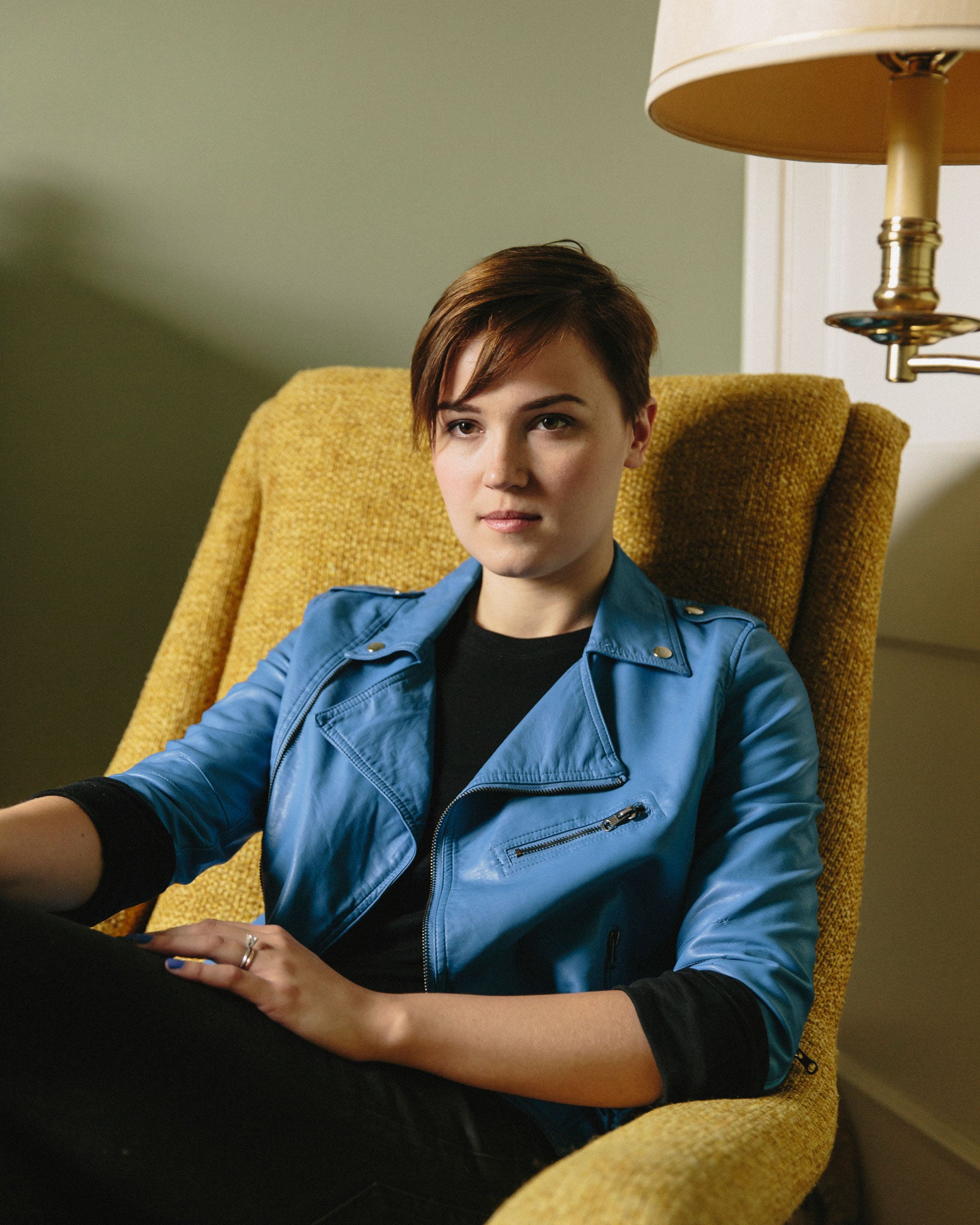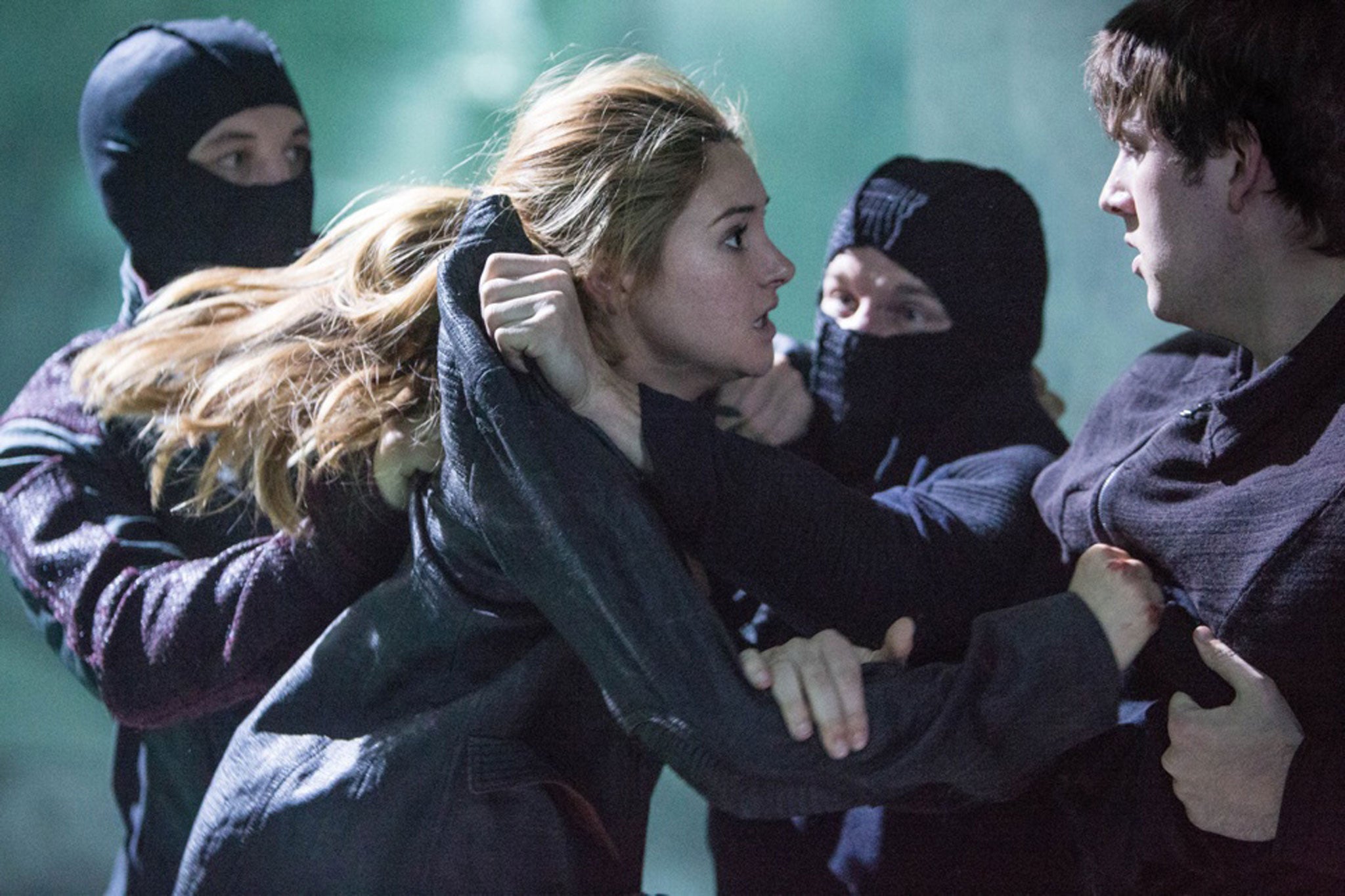'I don't want smut on the page': Divergent author Veronica Roth on sex and teen fiction
Her novels for young adults have sold more than five million copies and Hollywood is hoping the film of 'Divergent' will be the next 'Twilight'. So why is Veronica Roth so anxious? And how is she dealing with her fans who angrily tell her they think the ending of her trilogy has 'betrayed' them?

Your support helps us to tell the story
From reproductive rights to climate change to Big Tech, The Independent is on the ground when the story is developing. Whether it's investigating the financials of Elon Musk's pro-Trump PAC or producing our latest documentary, 'The A Word', which shines a light on the American women fighting for reproductive rights, we know how important it is to parse out the facts from the messaging.
At such a critical moment in US history, we need reporters on the ground. Your donation allows us to keep sending journalists to speak to both sides of the story.
The Independent is trusted by Americans across the entire political spectrum. And unlike many other quality news outlets, we choose not to lock Americans out of our reporting and analysis with paywalls. We believe quality journalism should be available to everyone, paid for by those who can afford it.
Your support makes all the difference.If the name Veronica Roth means little to you right now, then you are: a) probably not a teenager, and b) unlikely to be in the dark for much longer. The 25-year-old is the hottest property in the increasingly high-profile and commercially successful world of Young Adult fiction. Her recently completed trilogy of dark, dystopian novels has already sold more than five million copies across the world – an astonishing figure that will only grow over the coming 12 months.
An adaptation of Divergent, the first part of Roth's series, is set to appear in cinemas in the spring starring, among others, Kate Winslet. Episode three, Allegiant, has just been voted best Young Adult fantasy on the influential Goodreads website.
The Veronica Roth I encounter seems primed for global stardom. Striking, pale and elfin, she radiates poise, sitting almost motionless throughout our meeting, but seeming at home in her chic London hotel. In conversation, she is intelligent and polite to a fault, even when a question about the extent of her Hollywood ambitions gives her a mild case of the X-rateds. "You can't control what happens to a certain extent. It takes a special deal for an author to be that involved. I like writing – I don't want to make movies. I am not one of those people who wants to be in the shit with everyone else." Roth suddenly exclaims: "Excuse me!"
She might bridle at the suggestion that she is moving out of her natural sphere, but for the most part, Roth says the sorts of things a well-groomed bestselling writer on the brink of world domination ought to. I ask whether she is tempted to follow JK Rowling into more adult territory. "I don't have so much interest in that right now," she replies. "I love my readers so much, and I have so many ideas that fit into that Young Adult category. I know that's where I want to be. But there's so much freedom to do any genre. Especially weird things. It's a great time to be a YA writer now."
Indeed it is. Roth's books have prospered by exploring similar turbulent emotional territory to Twilight and The Hunger Games. At the centre is the relationship between a smart, tattooed, mercurial heroine, Tris, and her moody, vulnerable beau, Four. Like Twilight's Bella and Edward, the couple initially seem unsure whether to flirt or fight, but quickly lock hearts, mouths and possibly more besides. This seductive combination of romance, coy eroticism and tortured emoting accounts for large parts of Roth's mass appeal.

Divergent's smart high concept is that the population of Chicago, Roth's home city, has become an experiment in social engineering. Harmony of a sort is achieved through five "factions", each with their own character trait: Candor (honesty), Abnegation (selflessness), Dauntless (courage), Amity (sociability), and Erudite (intelligence). The trilogy narrates the breakdown of these boundaries. Having been raised to be selfless in Abnegation, Tris alienates her family by pledging herself to the rough- and-tumble risk-takers of Dauntless.
Although the trilogy tilts at broader themes (conformity, religion, self-sacrifice, social and genetic engineering), Roth herself steers clear of political critiques. "I don't think I have ever felt wise or old enough to point the finger at a society. I certainly have thought about the country I live in, but I was more interested in the personal." Nevertheless, she does confess herself baffled that depictions of sex provoke greater outrage in America than violence. 'When I first started writing, I was, like, 'Action movie – Bang, bang.' But with so many horrible things happening – shootings and things like that – I became a lot more careful with how I wrote. I don't mean that you have to exclude dark things, but you have to be careful about what you are including and why you are including them."
Roth is circumspect, even slightly prim, when discussing Allegiant's racier moments. Do Tris and Four actually consummate their relationship, I enquire, citing one heated, if ambiguous clinch. "I was concerned about not alienating my very young readers. I remember reading books at that age and stopping because I wasn't comfortable. I'm not trying to talk down to them. It's definitely a scene of great intimacy. That's what was important. I didn't want to have smut on the page. I don't want to titillate."
Roth rejects comparisons between herself and the rebellious, haunted Tris: "I was the good kid who came home at a reasonable hour and never did anything wrong." But the trilogy's coming-of-age arc – from fear to courage – finds echoes in Roth's life and personality. "It has been a little weird," she says of the writing process. "Like diving into my psyche. Tris grows up in an oppressive environment and chooses this bold path. I think anxiety makes your internal environment very oppressive. It makes you unable to do things you want to. Following her through this really bold move was helpful for me."
If one word defines Roth's character, it is anxiety. "When people reach out to me about very serious things, it is about mental illness. I have been pretty open about my struggles with anxiety and I think it makes it feel safe to tell me. People with anxiety problems really latch on to the whole message of, 'Be brave'."
Roth's battles with anxiety inspired Divergent in the first place. She was a freshman studying psychology at Minnesota's Carleton College. "I was learning about exposure theory: a phobia sufferer is exposed to the stimulus that provokes their fear response until they learn a healthier one. It does work very well." This inspired Divergent's initiation rites in which Tris and her comrades face their deepest terrors. Four is so-named because he only has four. Roth cheerfully confesses to rather more. "Bugs, heights, all sorts of things." When I ask if she has ever undergone exposure therapy herself, she replies: "Yes, but for anxiety not for a phobia."
I confess that, superficially at least, it is hard to imagine what Roth – young, successful, happily married (to the photographer Nelson Fitch)– has to be anxious about. She points to a combination of nature and nurture. "There is just a chemical imbalance in my brain that makes me anxious. Particularly being thrust into the public eye is a little intimidating. It's not even bad things that make me nervous. Interacting with people is tough."
In fact, the longer I spend in Roth's company, the more I realise that her highly polished persona shields someone every bit as fragile as the characters that populate her imagination. Roth's worries centre on an acute sensitivity to other people's judgements of her, and a nagging sense that she is disappointing them. Her increasing profile has only heightened her insecurity. A recent sold-out book tour of Britain and Ireland induced fretful self-questioning. "Only getting five seconds to make a good impression in a signing line is very hard for me. If I don't say the right thing, they'll be gone, and I'll have no chance to make amends."

Reading between the lines, the roots of Roth's anxiety extend back to childhood. "My parents are divorced," she says, her voice falling unmistakably on the final word. "My dad wasn't around us much when we were kids. My mom was pretty much managing three children and a job. My dad was helping, but being in the house day in, day out is the challenge of parenting. My mother is very brave, very strong in moments that must have been very hard for her. She never let that pain leak into us."
Mothers do well out of Divergent. Roth describes her own – a painter called Barbara Ross – as the most important influence on her writing. "My mom was a huge voice. She's not a writer, but she was always saying it's OK to fail as long as you've tried your hardest. I realised at a certain point the kinds of hard choices she had to make to make a better life for us."
Fathers fare less well both in life and art. Four's abusive father is one of Allegiant's villains, as is made clear in the book: "I know what he told me: that I was broken, that I was worthless, that I was nothing." Roth herself is distinctly uncomfortable when discussing her own. "He had a job, and worked far away. Now I have a good relationship with my stepdad," she adds quickly. When I return to her biological father, she takes evasive action. "You are pressing me, but I am not going to talk about it." Roth laughs unconvincingly when I apologise. "You're just doing your job," she replies as if she were describing a sewage plant.
Arguably the principal theme that connects Roth to her fiction is the question of how emotional damage can be repaired. "Allegiant's last line is about healing, and you can't talk about healing without talking about loss." Roth began her own restoration at school when she became a devout Christian: all three novels offer thanks to God in the acknowledgements. "It's a part of my personal life. The books have posed some challenges to me personally. Just struggling with the pressure, and how to conceive of yourself after you become successful very quickly. In that sense, my religious beliefs have been a great help."
There are moments talking to the likeable but elusive Roth when I worry slightly how she will withstand the attention 2014 will inevitably bring. It is a mark of Allegiant's success that it has been accompanied by Roth's first backlash, focused largely on the pleasingly brave and poignant ending. Roth rationalises the furore by pointing to the passions that her novels have provoked in her fans. "There's this intense feeling that they know this person and have some kind of friendship with them because they have been reading. To have something bad happen [to that character] is upsetting. It's like processing real grief over a real person."

Roth talks a good game, but has clearly been taken aback by the negative reaction on blogs, and comments on book-review sites such as Goodreads and Twitter. Fans complained that Tris's first-person narration had suddenly been diluted by the inclusion of the story from Four's point of view. But the real bone of contention was that unhappy ending for one of her major characters. A typical unfavourable Amazon review reads: "I felt just dead inside. I absolutely hate when a series ends leaving me feeling unsatisfied and even, in this case, angry. I feel kind of betrayed by the author."
Personally, I thought the ending was both well-judged and courageous. But surely Roth must have had some inkling that trouble was coming. After all, she has bolstered the appeal of her books with a smart and consistent web presence, including a popular and often confessional blog.
"I didn't really realise it was a brave decision until the book came out and everyone was saying, 'You suck and I hate you…'" How do you respond, I ask? "I don't. I have this official policy which is, do not engage. If people are going to say something mean, then they're allowed. It's a free country. But I don't have to answer."
This suggests the second major trope of Roth's conversation: learning to let things go. "The books have been my whole work life for more than three years. They changed everything. It is hard to let go." Or, here she is on handing over her characters to the film-makers. "The moment a book is published it stops belonging only to me and starts belonging to every individual who reads it. It has been a very healthy mindset. By the time they started casting the movie, I was already pretty well practised about letting go. Now it's up to them. I hope it turns out well. I had to let it go."
Whether Divergent can become the new Hunger Games remains to be seen. Regardless of its success, Roth looks set to be one of Young Adult fiction's more popular voices for some years to come. I only hope she can keep her fears at bay and enjoy her achievements.
"Success can really mess with your mind if you are not careful. The whole identity shift. Things become normal that aren't normal. I try to be careful. I have a lot of good people in my life who I've told, 'Kick me very hard in the butt if you think I am becoming this horrible, big-headed person.' They haven't done that yet, so I assume it hasn't happened. There are some challenges." She pauses. "But I was always afraid of them, so I am always aware."
'Divergent', 'Insurgent' and 'Allegiant' are published by Harper Collins. The film of 'Divergent' will be released in April
Home favourites: Three writers trying to break the American stranglehold on the genre
The Bone Season by 21-year-old English author Samantha Shannon is inspired by The Handmaid’s Tale and A Clockwork Orange. Set in a futuristic London, its strong heroine Paige has been compared to The Hunger Games’ Katniss. Film rights have been bought by Andy Serkis’s Imaginarium Studios.
The latest novel by the Carnegie-shortlisted author Annabel Pitcher is Ketchup Clouds. She told The Independent on Sunday last year: “I had to tone down the humour. There were a lot of jokes that I took out because my editor said they went too far. The ones that are in, I had to fight for.”
Darren Shan, the multi-million-selling Irish author of The Saga of Darren Shan (released as the film Cirque du Freak) and the Demonata series, will release three of the 12-novel Zom-B series this year. In the first, Gladiator, published this month, “B Smith has met her darkest challenge yet…”
Katy Guest
Join our commenting forum
Join thought-provoking conversations, follow other Independent readers and see their replies
Comments